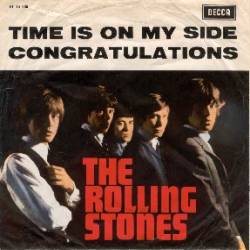Rolling Stones version
| "Time Is on My Side" | ||||
|---|---|---|---|---|
 | ||||
| Single by the Rolling Stones | ||||
| from the album The Rolling Stones No. 2 and 12 x 5 | ||||
| B-side | "Congratulations" | |||
| Released | September 25, 1964 (US single version) | |||
| Recorded | June 24–26, 1964 (US single version) | |||
| Studio | Regent Sound, London | |||
| Genre | ||||
| Length | 2:50 | |||
| Label | London | |||
| Songwriters |
| |||
| Producer | Andrew Loog Oldham | |||
| The Rolling Stones Americansingles chronology | ||||
| ||||
| ||||
Thomas' song came to the Rolling Stones' attention, as they often bought US-imported music from Soho shops. According to Garth Cartwright of the Financial Times , Thomas' "big chorus, blues flavour and callous dismissal of a lover" suited the band. [1] They first recorded the song in June 1964, within days of hearing it, at London's Regent Sound studios. They used a briefer organ-only intro and guitars in place of horns to create a rock anthem song, with vocalist Mick Jagger imitating Thomas' ad-libs. [1] [4] This looser arrangement was released as a single in the US on September 25, 1964, [4] and was included the following month on their US album 12 X 5 .
The single peaked at No. 6 on the US Billboard Pop Singles Chart to become the Rolling Stones' first top ten hit there [5] Their previous single, "It's All Over Now", had peaked at No. 26. Cash Box described the song at the time as a "throbbing rhythm affair" with "an effective mid-deck recitation". [6]
The second arrangement (more tightly arranged and featuring guitar in the intro), recorded in Chicago's Chess studio on November 8, 1964, [7] [1] was released in the UK on January 15, 1965, [8] on The Rolling Stones No. 2 . This later rendition is the one that receives the most airplay and appears on most "best of" compilations. Both versions incorporate elements of Irma Thomas' recording, including spoken-word interjections in the chorus, a monologue in the middle of the song, and distinctive lead guitar.[ citation needed ]
A live version of the song from the band's 1982 live album, Still Life , reached No. 62 in the UK Singles Chart. [9]
The song was part of the British Invasion, in which English covers of black American songs received more U.S. radio attention than the original had (although Thomas' version had been released as a B-side; most DJs played the A-sides). Thomas refused to sing her version after the Rolling Stones' recording for multiple decades, telling interviewers that the band had not acknowledged her despite giving support act slots to other singers like Tina Turner. In 1992, she began performing the song again following a TV show appearance in which the host Bonnie Raitt introduced her as the original singer. [1] On May 2, 2024, during the Rolling Stones' performance at the New Orleans Jazz & Heritage Festival, Jagger and Thomas performed the song as a duet, which was the first time the Rolling Stones had performed the song live since 1998. [10]
The Rolling Stones version of "Time Is on My Side" plays a key plot element in the 1998 movie Fallen , starring Denzel Washington.
Personnel
Credits adapted from Margotin and Guesdon [5]
- Mick Jagger – lead vocals and tambourine
- Keith Richards – lead guitar, rhythm guitar and backing vocals
- Brian Jones – rhythm guitar
- Bill Wyman – bass and backing vocals
- Charlie Watts – drums
- Ian Stewart – Vox Continental organ
Charts
| Chart (1964–65) | Peak position |
|---|---|
| Belgium (Ultratop 50 Flanders) [11] | 5 |
| Canada Top Singles ( RPM ) [12] | 3 |
| Finland (Soumen Virallinen) [13] | 20 |
| France | 4 |
| Germany (GfK) [14] | 28 |
| Netherlands (Single Top 100) [15] | 6 |
| New Zealand (Lever Hit Parade) [16] | 2 |
| Sweden (Kvällstoppen) [17] | 17 |
| Switzerland | 3 |
| US Billboard Hot 100 [18] | 6 |
| US (Cash Box) [19] | 6 |
| US (WABC) [20] | 3 |
| US (WLS) [21] | 7 |
| US (WMCA) [22] [23] | 1 |